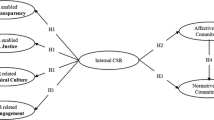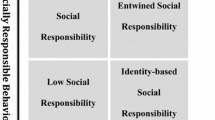Abstract
This article tracks Corporate Social Responsibility (CSR) as an emergent organizational process that places the employee at its center. Predominantly, research on CSR tends to focus on external pressures and outcomes leading to a neglect of CSR as a dynamic and developing process that relies on the involvement of the employee as a major stakeholder in its co-creation and implementation. Utilizing case study data drawn from a study of a large multinational energy company, we explore how management relies on employees’ interaction with CSR as the process of initiation → implementation → maturation develops. Employee involvement grows from a minor element in the CSR initiation stage to a vital contributory factor in CSR’s success in the later stages of the process. The article offers new insights into a processual and interactional approach to CSR that accounts for the actions of different actors involved at each stage. Most unusually, it also recognizes the dual impact this has on broader issues concerning the management and involvement of employees through CSR actions, and gaining legitimacy in the eyes of not only external stakeholders but internal too.
Similar content being viewed by others
References
Aaronson, S. A.: 2005, ‘“Minding Our Business”: What the United States Government Has Done and Can Do to Ensure that U.S. Multinationals Act Responsibly in Foreign Markets’, Journal of Business Ethics, 59(1-2), 175–98.
Agle, B. R., Mitchell, R. K. & Sonnenfeld, J. A.: 1999, ‘Who matters to CEOs? An investigation of stakeholder attributes and salience corporate performance and CEO values’, Academy of Management Journal, 42(5), 507-25.
Asongu, J. J.: 2007. ‘The History of Corporate Social Responsibility’, Journal of Business and Public Policy, 1(2), 1-18.
Bakan, J.: 2004, The Corporation: The Pathological Pursuit of Profit and Power. Constable, London, pp. 25–59.
Balabanis, G., Phillips, H. C. & Lyall, J.: 1998, ‘Corporate social responsibility and economic performance in the top British companies: are they linked?’, European Business Review 98(1), 25-44.
Basil, D. Z., & Weber, D.: 2006, ‘Values motivation and concern for appearances: the effect of personality traits on responses to corporate social responsibility’, International Journal of Nonprofit & Voluntary Sector Marketing 11, 61–72.
Bolton, S. C.: 2007, Dimensions of Dignity at Work (Butterworth Heinemann, London).
Bolton, S. C. & Wibberley, G.: 2007, ‘Best Companies, Best Practice and Dignity at Work’, in S. C. Bolton (eds), Dimensions of Dignity at Work. Butterworth Heinemann: London, pp. 134-153.
Boxall, P. & Purcell, J.: 2003, Strategy and Human Resource Management. Palgrave Macmillan, New York, pp. 11-13.
Bragues, G.: 2006, ‘Seek the Good Life, Not Money: The Aristotelian Approach to Business. Ethics’, Journal of Business Ethics 67, 341-357.
Branco, M. C. & Rodrigues, L. L.: 2006, ‘Corporate Social Responsibility and Resource-Based Perspectives’, Journal of Business Ethics 69(2), 111-32.
Carroll, A. B.: 1979, ‘A Three-Dimensional Conceptual Model of Corporate Social Performance’, Academy of Management Review 4(4), 497-505.
Carroll, A. N. & Bucholtz, A. K.: 2003, Business and Society: Ethics and Stakeholder Management. Thomson Learning: Mason, pp. 47-65.
Carson, T. L.: 2003, ‘Self-interest and business ethics: Some lessons of the recent corporate scandals’, Journal of Business Ethics 43(4), 389-394.
Clulow, V.: 2005, ‘Futures dilemmas for marketers: can stakeholder analysis add value?’, European Journal of Marketing 39(9/10), 978-98.
Collier, J., & Esteban, R. (2007). Corporate social responsibility and employee commitment. Business Ethics. Oxford, 16(1), 19-33.
Cowe, R., Draper, S., Elkington, J. & Knight, D.: 2002, The Corporate Social Responsibility Manual: A practical approach to sustainable business (Spiro Press, Rollinsford).
Cragg, W.: 2000, ‘Human rights and business ethics: Fashioning a new social contract’, Journal of Business Ethics 27(1/2), 205-215.
de Wit, M., Wade, M. & Schouten, E.: 2006, ‘Hardwiring and softwiring corporate responsibility: a vital combination’, Corporate Governance 6(4), 491-505.
Donaldson, T. & Preston, L.: 1995, ‘The Stakeholder Theory of the Corporation: Concepts, Evidence, and Implications’, Academy of Management Review 20(1), 65-91.
Dunning J. H. 2003. Making Globalization Good: The Moral Challenges of Global Capitalism. Oxford: Oxford University Press. pp. 11-40.
Eisenhardt, K. M., & Graebner, M. E.: 2007, ‘Theory Building From Cases: Opportunities and Challenges’, Academy of Management Journal 50(1), 25-32.
Euh, Y.-D. & Rhee, J. H.: 2007, ‘Lessons from the Korean Crisis: Policy and Managerial Implications’, Long Range Planning 40(2007), 431-445.
Farrelly, F. J. & Greyser, S. A.: 2007, ‘Sports Sponsorship to Rally the Home Team’, Harvard Business Review 85(9), 22-24.
Ferrary, M.: 2009, ‘A Stakeholder’s Perspective on Human Resource Management’, Journal of Business Ethics 87(1), 31-43.
Frankental, P.: 2001, ‘Corporate social responsibility - a PR invention?’, Corporate Communications 6(1), 18-24.
Freeman, R. E.: 1984, Strategic management: A stakeholder approach (Pitman Publishing, Boston).
Freeman, R. E.: 1994, ‘The politics of stakeholder theory: Some future directions’, Business Ethics Quarterly 4(4), 409-421.
Freeman, R. E. & Phillips, R.: 2002, ‘Stakeholder theory: A libertarian defense’, Business Ethics Quarterly 12(3), 331-350.
Frynas, J. G.: 2003, ‘Global Monitor: Royal Dutch/Shell’, New Political Economy 8(2), 275-285.
Ghauri, P. 2004. ‘Designing and Conducting Case Studies in International Business Research’. In: Marschan-Piekkari P. Welch C. (eds). Handbook of Qualitative Research Methods for International Business. Edward Elgar: Cheltenham, pp.109-124.
Giddens, A.: 1984, The Constitution of Society: Outline of the Theory of Structuration (University of California Press, Berkeley).
Gooderham, P., Nordhaug, O. 2003, International management: Cross Boundary Challenges. Oxford: Blackwell Publishing Ltd, pp.336-355.
Grayson, D. & Hodges, A.: 2001, Everybody’s Business: Managing risks and opportunities in today’s global society (Dorling Kindersley, London).
Greening, D. W. & Turban, D. B.: 2000, ‘Corporate social performance as a competitive advantage in attracting a quality Workforce’, Business and Society 39(3), 254-280.
Hine, J. A. H. S. & Preuss, L.: 2009, ‘“Society is Out There, Organisation is in Here”: On the Perceptions of Corporate Social Responsibility Held by Different Managerial Groups’, Journal of Business Ethics 88(2), 381-393.
Houghton, S. M., Gabel, J. T. A. & Williams, D. W.: 2009, ‘Connecting the Two Faces of CSR: Does Employee Volunteerism Improve Compliance?’ Journal of Business Ethics 87(4), 477-494.
Husted, B. W.: 2005, ‘Risk Management, Real Options, Corporate Social Responsibility’, Journal of Business Ethics 60(2), 175-183.
Husted, B. W. & Allen, D. B.: 2006, ‘Corporate social responsibility in the multinational enterprise: strategic and institutional approaches’, Journal of International Business Studies. Washington 37(6), 838-849.
Jawahar, I. M. & McLaughlin, G. L.: 2001, ‘Toward a descriptive stakeholder theory: An organizational life cycle approach’, The Academy of Management Review 26(3), 397-414.
Johansen, T. R.: 2008, ‘Employees and the Operation of Accountability’, Journal of Business Ethics 83(2), 247-263.
Jones, T. M.: 1995, ‘Instrumental stakeholder theory: A synthesis of ethics and economics’, The Academy of Management Review 20(2), 404-437.
Kakabadse, A. & Kakabadse, N.: 2007, CSR in Practice: Delving Deep (Palgrave Macmillan, New York).
Kant, I.: 1785/1993, Grounding for the Metaphysics of Morals translated by James W. Ellington (Hackett, Indianapolis).
Karnes, R. E.: 2009, ‘A Change in Business Ethics: The Impact on Employer–Employee Relations’, Journal of Business Ethics 87, 189–197.
KPMG: 2005, KPMG International Survey of Corporate Responsibility Reporting (KPMG Global Sustainability Service).
Maak, T. & Pless, N. M.: 2009, ‘Business Leaders as Citizens of the World. Advancing Humanism on a Global Scale’, Journal of Business Ethics 88(3), 537-550.
McWilliams, A., Siegel, D. S. & Wright, P. M.: 2006, ‘Corporate Social Responsibility: Strategic Implications’, Journal of Management Studies 43(1), 1-18.
Morgan, G.: 1986, Images of Organization (Sage, Thousand Oaks, CA).
Orlitzky, M. & Benjamin, J. D.: 2001, ‘Corporate Social Responsibility and Firm Risk: A meta-analytic review’, Business and Society 40(4), 369-396.
Packer, A. H. & Sharrar, G. K.: 2003, ‘Linking lifelong learning, corporate social responsibility, and the changing nature of work’, Advances in Developing Human Resources 5(3), 332-341.
Pinnington, A., Macklin, R. & Campbell, T.: 2007, Human Resource Management: Ethics and Employment. Oxford: Oxford University Press, pp. 121-127.
Porter, M. & Kramer, M. R.: 2002, ‘The competitive advantage of corporate philanthropy’, Harvard Business Review 80(12), 57-68.
Porter, M. & Kramer, M. R.: 2006, ‘Strategy & Society: The Link Between Competitive Advantage and Corporate Social Responsibility’, Harvard Business Review 84(12), 78-92.
Pursey P., Heugens, A., Kaptein, van Oosterhout, J. (2008) Contracts to Communities: A Processual Model of Organizational Virtue. Journal of Management Studies 45(1), 100–121.
Redington I. 2005. Making CSR Happen: the contribution of people management. London: The Chartered Institute of Personnel and Development (CIPD).
Reich, R.: 2007, Supercapitalism: The Battle for Democracy in an Age of Big Business (Alfred A. Knopf: New York), pp. 168-173.
Remenyi, D., Williams, B., Money, A., & Swartz, E.: 1998, Doing Research in Business and Management, (Sage Publications : London).
Rodrigo, P. & Arenas, D.: 2008, ‘Do Employees Care About CSR Programs? A Typology of Employees According to their Attitudes’, Journal of Business Ethics 83(2), 265-283.
Rodrigues, S. & Child, J.: 2008, ‘The Development of Corporate Identity: A Political Perspective’, Journal of Management Studies 45(5), 885-911.
Rowley, T. J.: 1997, ‘Moving Beyond Dyadic Ties: A Network Theory of Stakeholder Influences’, Academy of Management Review 22(4), 887-910.
Scholtens, B.: 2006, ‘Finance as a Driver of Corporate Social Responsibility’, Journal of Business Ethics 68(1), 19-33.
Sharratt, D., Brigham, B. H. & Brigham, M.: 2007, ‘The Utility of Social Obligations in the UK Energy Industry’, Journal of Management Studies 44(8), 1503-1522.
Siggelkow, N. (2007). Persuasion With Case Studies. Academy of Management Journal, 50(1), 20-24.
Smith, A.: 1976 [1776], An Inquiry into the Nature and Causes of Wealth Of Nations (Liberty Fund: Indianapolis).
Smith, A.: 1982 (1759), The Theory of Moral Sentiments (Oxford University Press, Oxford).
Story, D. & Price, T. J.: 2006, ‘Corporate Social Responsibility and Risk Management?’, The Journal of Corporate Citizenship 22(Summer), 39-51.
Szwajkowski, E.: 2000, ‘Simplifying the Principles of Stakeholder Management: The Three Most Important Principles’, Business and Society 39(4), 379-396.
Taylor, J.: 2002, ‘Enron Was No Friend to Free Markets’, Wall Street Journal (Eastern edition), 21 January: 12.
ten Bos, Rene.: 1997, ‘Essai: Business Ethics and Bauman Ethics’, Organization Studies 18(6), 997-1014.
The Sunday Times: 2009, The Sunday Times 100 Best Companies 2009, (The Sunday Times in association with CIPD, London).
Tilson, D. & Donald, V.: 1985, ‘Corporate Philanthropy Comes of Age’, Public Relations Review 11(2), 26-33.
Tsai, M. T. & Huang, C. C.: 2008, ‘The Relationship among Ethical Climate Types, Facets of Job Satisfaction, and the Three Components of Organizational Commitment: A Study of Nurses in Taiwan’, Journal of Business Ethics 80, 565-581.
Turban, D. & Greening, D.: 1997, ‘Corporate Social Performance and Organizational Attractiveness to Prospective Employees’, Academy of Management Journal 40(3), 658-672.
Ullmann, A.: 1985, ‘Data in search of a theory: a critical examination of the relationships among social performance, social disclosure, and economic performance of US firms’, Academy of Management Review 10(3), 540-557.
van Tulder, R. & Kolk, A.: 2001, ‘Multinationality and corporate ethics: codes of conduct in the sporting goods industry’, Journal of International Business Studies 32(2), 267-283.
Vogel, D.: 2005, The Market for Virtue: The Potential And Limits Of Corporate Social Responsibility (Brookings Institution Press, Washington).
Vuontisjärvi, T.: 2006. ‘Corporate Social Reporting in the European Context and Human Resource Disclosures: An Analysis of Finnish Companies’, Journal of Business Ethics 69(4), 331-354.
Welford, R.: 2005, ‘Corporate Social Responsibility in Europe, North America and Asia: 2004 Survey Results,’ The Journal of Corporate Citizenship 17(Spring), 33-51.
Werther, W. B. J. & Chandler, D.: 2005, ‘Strategic corporate social responsibility as global brand insurance’, Business Horizons 48(4), 317-324.
Wheeler, D., Fabig, H. & Boele, R.: 2002, ‘Paradoxes and Dilemmas for Stakeholder Responsive Firms in the Extractive Sector: Lessons from the Case of Shell and the Ogoni’, Journal of Business Ethics 39(3), 297-318.
White, J. A.: 2004, ‘Globalisation, Divestment and Human Rights in Burma’, The Journal of Corporate Citizenship 14(Summer), 47-65.
Zappala, G. (2004). Corporate Citizenship and Human Resource Management: A New Tool or a Missed Opportunity? Asia Pacific Journal of Human Resources. London, 42(2), 185-201.
Author information
Authors and Affiliations
Corresponding author
Rights and permissions
About this article
Cite this article
Bolton, S.C., Kim, R.Ch. & O’Gorman, K.D. Corporate Social Responsibility as a Dynamic Internal Organizational Process: A Case Study. J Bus Ethics 101, 61–74 (2011). https://doi.org/10.1007/s10551-010-0709-5
Published:
Issue Date:
DOI: https://doi.org/10.1007/s10551-010-0709-5




